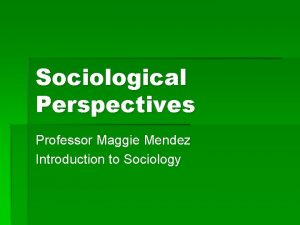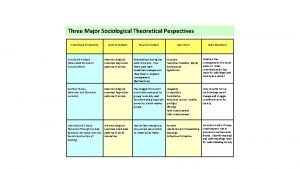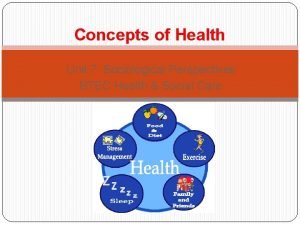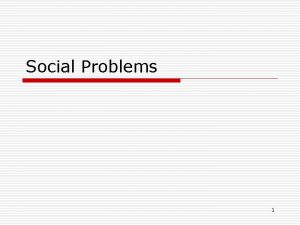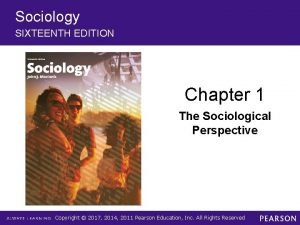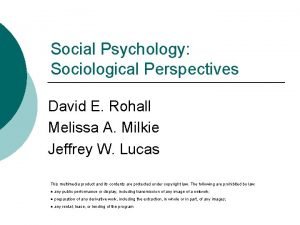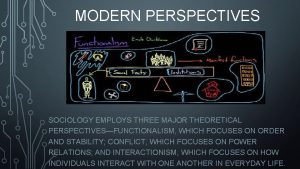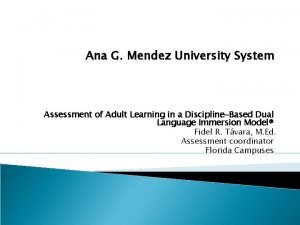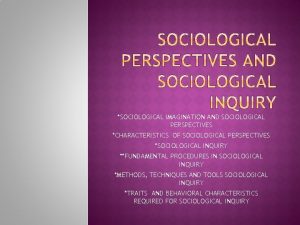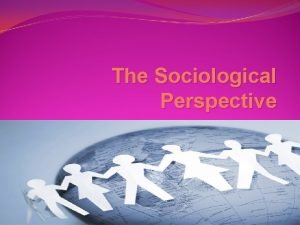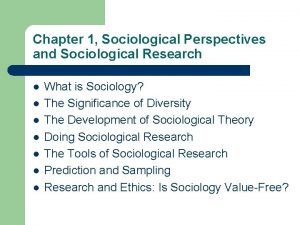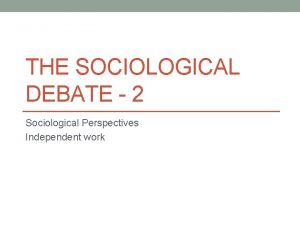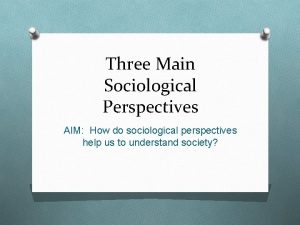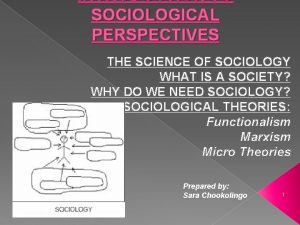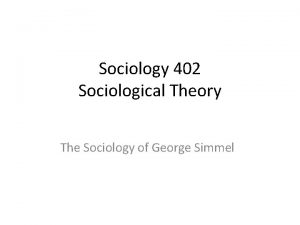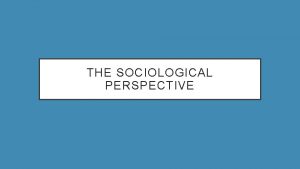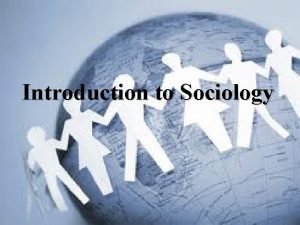Sociological Perspectives Professor Maggie Mendez Introduction to Sociology














- Slides: 14

Sociological Perspectives Professor Maggie Mendez Introduction to Sociology

What is a Sociological Perspective? § Tool for analyzing social life. § Level of analysis • • Macro Micro § Three major perspectives in Sociology • • • Functualist Perspective Conflict Perspective Symbolic Interaction Perspective

Functionalist Perspective § Vision of Society • A system of interrelated parts that function or operate together harmoniously. • Organism • Social System • Macro Perspective

Organism § Society is viewed as very similar to the human body. • Each part meets a need in order to maintain a normal state of balance. • Organs are viewed as similar to social systems. 4

Social Systems § Interdependent network of social institutions (family, school, business, religion, etc. ) that shape our live. § Social system contributes the stability of society. § Equilibrium § Disequilibrium 5

Macro-level of Analysis § Homelessness • Examine how changes in parts of society have increased homelessness. ØEconomy ØFamily

Conflict Perspective § Vision of Society • Society is constantly changing in response to social inequality and conflict. • Power struggle • Social Change § Macro Perspective

Power Struggle Wealth, Power, Prestige Resources, Control, Authority Dominate Groups Subordinate Groups Various groups are in conflict to compete for limited resources, control, or authority. 8

Social Change § Conflict is inevitable and can be beneficial. § Leads to social change. § Example: § Civil Rights Movement • Desegregation

Macro Level of Anaysis § Homelessness • Examine the struggle between social classes. ØUpper classes control the economy

Symbolic Interactionist Perspective § Vision of Society • Focus on meanings that people place on their own and one another’s behavior. • Symbols • Society is created through social interaction. § Micro Perspective

Symbols § People use symbols to develop views about the world and communicate with one another. § Define ourselves and others • Relationships • Self-concept § Social interactions allows society to exist

Micro Level of Analysis § Homelessness • Analyze the culture and communication of homeless people. ØHow do they survive? ØHow do they interact with one another in the shelters and streets?

Summary and Review Perspective Level of Point of View Analysis Functionalist Marco level Various parts Examine how changes in parts of of society are society have increased interdependent homelessness. and related. Conflict Macro level Struggle for scarce resources by groups in society. Symbolic Micro Interactionist level Explaining the Homelessness Examine the struggle between social classes. How people use Analyze the culture and symbols to communication of homeless people. create society.
 Maggie mendez
Maggie mendez Sociological imagination vs sociological perspective
Sociological imagination vs sociological perspective Three theoretical perspectives in sociology
Three theoretical perspectives in sociology Sociological perspectives in health and social care unit 10
Sociological perspectives in health and social care unit 10 What are social problems
What are social problems Sociology 16th edition
Sociology 16th edition Social psychology sociological perspectives
Social psychology sociological perspectives Major perspective in sociology
Major perspective in sociology Promotion from assistant to associate professor
Promotion from assistant to associate professor Mattie is a new sociology professor
Mattie is a new sociology professor Rosaura mendez gamboa
Rosaura mendez gamboa Armas mendez, hugo eduardo
Armas mendez, hugo eduardo Ana g mendez biografia
Ana g mendez biografia Mendez rojas class chart
Mendez rojas class chart Casa mendez librilla
Casa mendez librilla
